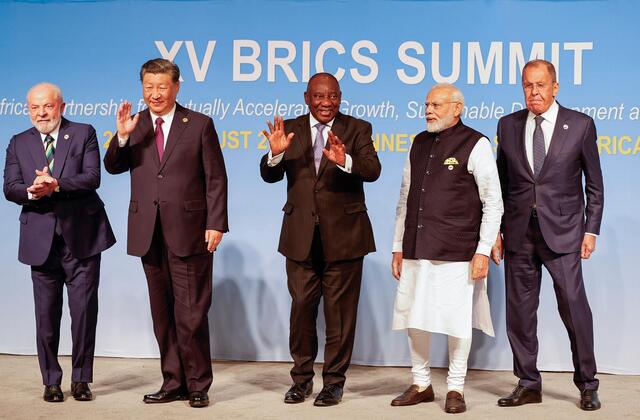The three-day annual summit of the BRICS nations concluded on Thursday in the historic city of Johannesburg with formal approval of Johannesburg declaration-II and admission of six new members to the bloc that would shore up its regular membership to 11 countries from across three continents of the globe. During the session, the BRICS leaders decided to invite six countries including Argentina, Egypt, Ethiopia, Iran, Saudi Arabia and the United Arab Emirates to their club and those nations will formally join the bloc at the beginning of the new year on January 1, 2024.
The first-ever expansion of the five-member BRICS family of developing economies marked a historic milestone that not only underscored the solidarity of the developing nations but also categorically expressed their commitments to work together and achieve a shared and better future through unity and multilateral cooperation among their nations. Today’s world is rapidly galloping from a unipolar system to multi-polarization and South-Eastern multilateralism is currently replacing Western hegemonism in the world. Interestingly, the quest for multilateralism and drive for cooperation among the developing nations largely emerged as a response to decadeslong Western cartels that controlled the world economy, global politics and international trade in the aftermath of World War II. Meanwhile, the collapse of the former Soviet Union and US-led global order further shattered the geostrategic balance and exposed the Western monopoly over the rest of the world.
Historically, the family of five comprising Russia, China, South Africa, India and Brazil formed a bloc about a decade ago to enhance their cooperation to strengthen their voice and autonomy in global issues to ultimately forge an equitable, diverse and multi-polar world order that protects political, economic and security interests of developing nations. Being home to about 40% of the world population and about one-fourth of global GDP, the BRICS nations had performed exceptionally well over the past 13 years in multiple domains besides emerging as a counterweight to the US-led Western bloc and European economic cartels.
Historically, trade blocs, economic partnerships and security alliances have always been of great importance for political stability, economic growth, trade and investment activities of the member nations, because those bilateral and multilateral arrangements enhance cooperation and remove trade barriers between the member nations that equally benefit all partnering nations. Due to these reasons, a large number of countries are currently intending to join the BRICS to strengthen their bonds with five major developing economies and boost their trade, economic and security cooperation with the leading nations in Asia, Africa and Latin America.
At the same time, BRICS has emerged as an anti-US and anti-west club, because a majority of American rivals except for South Africa and India had assembled at BRICS forum while the admission of Iran, KSA and UAE would further deepen those impressions whose interests are currently well aligned with Russia and China. The BRICS family is also leading the efforts for the de-dollarization of the global economy by taking steps to conduct bloc trade in local currencies. Apparently, BRICS members such as Iran, KSA, Brazil and Russia’s decision to trade oil in local currencies, Russian ruble or Chinese yuan would be a real blow to the American greenback. Amid all pro-poor manifesto and anti-west rehotric, the BRICS club has laregly divided into two groups based on their political and economic interests in the contemporary world. New Delhi has extensively used the forum against its regional opponents while the Russo-China alliance intends to use the BRICS forum to achieve their global agenda. Thus, every hegemon is blatantly using the group to its advantage, but every developing nation has filed its candidature to benefit from the so-called liberal consortium. Although BRICS is expanding its role, size and manifesto gradually, the success of this privileged club of developing nations will be judged by the time.







